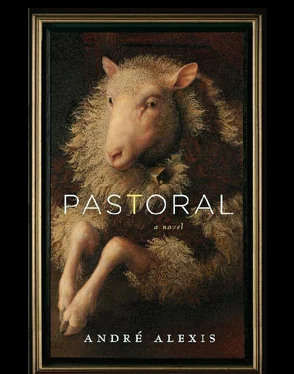Robbie preferred to tend cows. He was used to cows. He could tell when a cow was sick or healthy or simply wanted milking. With sheep it was all slightly foreign to him. There were always too many of them, gathered together to protect themselves. And it was difficult to care about a clump of bleating creatures whose fleeces were so lanolin-saturated your hand would come out of a fleece greasy and stinking of sheep. He might, eventually, have grown used to the physical fact of sheep, but he could not get used to the irritation of watching over them. Bored while shepherding, he had too much time to think. And having time to think, he had time to make himself unhappy.
These days, time with himself was especially hard to bear. He had told his fiancée, a woman he loved, that he was also in love with another woman. Worse, he was screwing the other woman, though he still hoped to marry his fiancée. There was no getting around how foolish that hope sounded. Looking over the sheep as they jostled and bleated, he could think of nothing but the hurt and resentment in Elizabeth’s eyes when they’d spoken. She had not believed he loved her, and he had walked back home upset because he did love Elizabeth. That she had not believed he loved her and Jane equally was to be expected. No one believed him. It seemed the world could not or would not believe that his predicament was not, strictly speaking, a sexual matter. His friends imagined him first in the arms of one, then in the arms of the other, a situation they all thought enviable. But how different the reality. He had, in fact, gone directly from one bed to the other, perhaps half a dozen times, but what harrowing times they had been. Jane’s pleasure was in having him before Elizabeth did. And on occasion, she had tried to exhaust him, letting him up from bed only when she was sure his prick was ‘useless.’
A group of sheep had separated from the flock. As much as it was possible for sheep to look suspicious, they looked suspicious. To give himself something to do, he watched as Clyde, the border collie, harassed and nipped the wayward ones back to the group. This distraction lasted only a moment. No sooner were the sheep where they should have been than Robbie was again defending himself against his own opinions and those of the world. What people could not see, he thought, was that Jane and Elizabeth were entirely different. If he had also been in love with someone like Liz, well, then, yes, perhaps he could have been considered unfaithful. But where Elizabeth was considerate, careful and gently loving, Jane was unpredictable, selfish and a whirlwind. Where Jane was restless, inventive and adventurous beyond common sense, Elizabeth was constant, patient, adventurous only where the ground was well-known. Jane was physically solid, and he could lose himself in her body. Liz was graceful, her arms and legs like ivy about him. And then there was the matter of company. He could spend hours and hours happily alone with Liz, the two of them walking through the woods or watching old movies. Jane was bored by trees and refused to watch movies that didn’t feature naked bodies and high death counts. He could not imagine living with Jane as man and wife, but neither could he imagine a life without Jane there to keep him from drowning at home. So, he loved both equally, knew he could marry Liz, not Jane, and was certain his life would be miserable without both of them in it.
Just as he was beginning to worry about himself in earnest, Robbie’s thoughts were, mercifully, interrupted by Anne Bigland. He saw her approach in the distance, bringing him his lunch in a wicker basket. Though they had little to talk about these days, he was relieved at the sight of her. Stepping on birch twigs that clicked and snapped beneath him, Robbie went out to meet her. He was followed at a respectful distance by Clyde, the most mild-mannered border collie there has ever been.
— I hope you’re hungry, said Anne. Mom made you three sandwiches, ’cause she wasn’t sure what kind you’d want. And there’s coffee and orange juice.
— Lunch is the best thing about watching sheep, said Robbie.
— I know, said Anne. Are you bored? I could keep you company.
— I wouldn’t mind if you did stay awhile. I’m bored as hell. If it wasn’t for the stray dogs around, you could leave these sheep on their own. They’re not going anywhere.
Clyde, soul of discretion, lifted his muzzle slightly, allowing himself a circumspect sniff of Robbie’s sandwich. He then sat perfectly still: his way of getting attention. And seeing how still Clyde sat, Robbie pulled a morsel from his ham sandwich and offered it to the dog. With the most discreet of motions, a tilt of his head and a flash of pink tongue, Clyde took everything that lay on Robbie’s palm. He swallowed the piece of ham sandwich and, once again, sat up straight and stock-still.
— Everything okay these days? Anne asked.
— Yeah, everything’s okay.
— You still getting married?
— Looks like it.
The three of them — Clyde, Robbie, Anne — stood or sat quietly. Robbie was grateful for company, but there was nothing he wanted to say to Anne Bigland and, as usual, nothing she could bring herself to say to him, a habit of shyness having set in long before this. Her crush on him was obvious to all. It was clear even to Robbie himself and he was not an observant man.
Not far from them, the sheep began to bleat. A wind troubled the grasses and brought the smell of pine with it. Anne’s hair blew in her face and she tucked the strands behind her ears. It occurred to Robbie that she was beautiful. If he’d had a sister, he thought, this is exactly how he would feel for her.
— Do you want some of this sandwich? he asked.
Though she wasn’t hungry, she took half the peanut butter and crab-apple jelly sandwich and ate with him.
Jane Richardson loathed Barrow and rural Ontario and anything that smacked of ‘flora and fauna.’ She was unsettled, and angry at having been born and raised in Barrow, Lambton County, Ontario, Canada. She thought it an injustice that she had not been asked if she wanted to be of this place, this county, this land. It was difficult to know whom to blame for her ‘birth in exile,’ so she blamed whomever it pleased her to blame: her parents, God, the land or her sheep-like, complacent fellow citizens.
Jane was not born with loathing for southern Ontario. Her first memories of Barrow were good, if banal: a dying bird in her parents’ back garden, burrs sticking to her school dress and scratching her thighs when she sat down, snow at Christmas, a strong wind plucking an umbrella from the ground and daintily planting it in a field some distance away. There were thousands of such impressions, and all of them added up to a childhood. As she grew up, however, the bright memories faded or were pushed aside so that, by twelve, she could not have named anything interesting about Barrow. The list of great things it did not have, on the other hand, grew wildly: from the general (Barrow did not have a bar that served elegant drinks) to the specific (Barrow had no Sphinx, no Louvre, no Hagia Sophia). By the age of twelve, Jane Alexandra Richardson was aware that she had been born in a backwater.
For some, hatred of home is mixed with a tincture of self-hatred. But this wasn’t so for Jane. She did not think it her fault she’d been born in Barrow. Nor did she exclusively blame her parents, both of whom she loved. Her dislike of Barrow was imperturbable and objective. At fourteen, she had promised herself she would leave the town as soon as she turned sixteen. She would move to the United States, to San Francisco, say, and send for her parents when she had made the beginnings of her fortune. But she had not left at sixteen. She’d been too frightened to leave. Her parents had insisted she finish her education, and her friends had warned her about cities and violence. And she had listened. And in listening to others, she’d betrayed herself. And as far as she was concerned, she continued to betray herself with every moment that passed with her still in Barrow.
Читать дальше












